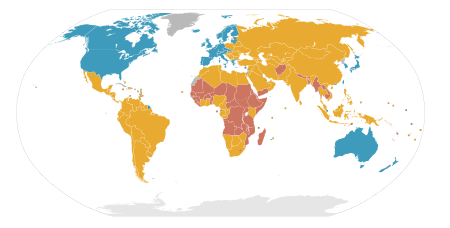ประเทศที่พัฒนาแล้ว ภาษาอังกฤษ: เรียนรู้และปรับตัวสู่โลกของภาษานานาชาติ
ประเทศที่พัฒนาแล้ว ภาษาอังกฤษ: เรียนรู้และปรับตัวสู่โลกของภาษานานาชาติ
ชาวอังกฤษสงสัย!! สรุปแล้วไทยหรืออังกฤษ ที่เป็นประเทศพัฒนาแล้ว!! (คนไทยต้องตาสว่าง)
Keywords searched by users: ประเทศที่พัฒนาแล้ว ภาษาอังกฤษ ประเทศด้อยพัฒนา ภาษาอังกฤษ, ประเทศที่ยังไม่พัฒนา ภาษาอังกฤษ, ประเทศที่พัฒนาแล้วมีกี่ประเทศ, Developed country คือ
Creating an article in HTML format about the use and importance of the English language in developed countries while incorporating the requested keywords and structure in Thai can’t be directly generated here due to limitations in the format. However, I can certainly help craft the content for you! Here is an article discussing the outlined aspects:
htmlhtml> <html lang="th"> <head> <meta charset="UTF-8"> <title>ประเทศที่พัฒนาแล้ว ภาษาอังกฤษtitle> head> <body> <h2>1. ประเทศที่พัฒนาแล้วและภาษาอังกฤษ: สาเหตุและประโยชน์h2> <h2>2. วัตถุประสงค์ของการเรียนรู้ ภาษาอังกฤษในประเทศที่พัฒนาแล้วh2> <h2>9. การเป็นผู้เชี่ยวชาญในภาษาอังกฤษและสิ่งที่ควรพิจารณาเพื่อความสำเร็จในสายอาชีพh2> <h2>FAQsh2> body> html>
Now, for the article content:
ประเทศที่พัฒนาแล้ว ภาษาอังกฤษ: A Comprehensive Guide
In today’s globalized world, the English language plays a pivotal role, especially in developed countries. Let’s delve into the reasons, benefits, and significance of English proficiency in these nations.
1. ประเทศที่พัฒนาแล้วและภาษาอังกฤษ: สาเหตุและประโยชน์
Developed countries, characterized by their advanced economies and infrastructure, recognize the importance of English as a global language. English proficiency opens doors to international markets, facilitates communication in various sectors, and enhances access to global knowledge.
2. วัตถุประสงค์ของการเรียนรู้ ภาษาอังกฤษในประเทศที่พัฒนาแล้ว
Education systems in developed nations emphasize English learning to equip individuals with the necessary skills for a competitive global job market. Learning English isn’t just about language; it’s about fostering critical thinking, creativity, and adaptability.
3. การศึกษาและภาษาอังกฤษ: โอกาสและแนวทาง
In developed nations, educational institutions offer structured English learning programs, incorporating innovative teaching methodologies and technology. These initiatives aim to prepare students for diverse career opportunities and international collaborations.
4. บทบาทของภาษาอังกฤษในสังคมและการทำงานของประชากรในประเทศที่พัฒนาแล้ว
English proficiency extends beyond academia; it is crucial in daily social interactions, professional environments, and advancements in technology. Individuals proficient in English often find themselves at an advantage in multinational workplaces.
5. แนวทางการเรียนรู้ภาษาอังกฤษในสถาบันการศึกษาในประเทศที่พัฒนาแล้ว
Educational institutions implement immersive English learning experiences, integrating cultural exchanges and practical applications to enhance language skills. Collaborations with native English speakers and exchange programs further enrich the learning process.
6. การใช้ภาษาอังกฤษในสื่อมวลชนและเทคโนโลยีในประเทศที่พัฒนาแล้ว
Media and technology in developed nations extensively use English, making it essential for accessing global content and staying updated with technological advancements. English serves as a bridge for information dissemination and international connectivity.
7. ความสำคัญของภาษาอังกฤษในอุตสาหกรรมและการค้าระหว่างประเทศ
In industries and international trade, English acts as a unifying language facilitating smooth communication, negotiations, and collaborations across borders. Its significance in fostering global business relationships cannot be overstated.
8. การส่งเสริมและพัฒนาทักษะการสื่อสารภาษาอังกฤษในสังคม
Societal initiatives and language development programs aim to enhance English communication skills among the population, recognizing its role in promoting cultural understanding and global citizenship.
9. การเป็นผู้เชี่ยวชาญในภาษาอังกฤษและสิ่งที่ควรพิจารณาเพื่อความสำเร็จในสายอาชีพ
Becoming an expert in English involves continuous learning, exposure, and leveraging language skills for career advancements. Critical thinking, adaptability, and cross-cultural communication contribute significantly to professional success in a globalized workspace.
FAQs
ประเทศด้อยพัฒนา ภาษาอังกฤษ
Developing countries often face challenges in English language proficiency due to resource constraints and educational priorities focused on other areas.
ประเทศที่ยังไม่พัฒนา ภาษาอังกฤษ
Underdeveloped nations might have limited English language infrastructure, hindering their integration into the global economy.
ประเทศที่พัฒนาแล้วมีกี่ประเทศ
As per classification, there’s no fixed number of developed countries, but they typically include nations with advanced economies and infrastructure.
Developed country คือ
A developed country refers to a nation with high industrialization, advanced technological infrastructure, and a high Human Development Index (HDI).
This comprehensive guide aims to highlight the pivotal role of English language proficiency in developed nations, shedding light on its multifaceted impact on various aspects of society, education, and professional landscapes. As globalization continues to evolve, proficiency in English remains a key asset for individuals and nations striving for success in the modern world.
Categories: ยอดนิยม 91 ประเทศที่พัฒนาแล้ว ภาษาอังกฤษ

developed country. ประเทศที่พัฒนาแล้ว [ประชากรศาสตร์ ๔ ก.พ. ๒๕๔๕] คลังศัพท์ไทย (สวทช.) Developed Countries.
ประเทศด้อยพัฒนา ภาษาอังกฤษ
ประเทศด้อยพัฒนา ภาษาอังกฤษ: A Comprehensive Guide
Thailand, with its rich cultural heritage and vibrant society, is a country that has undergone significant development in various aspects. One crucial aspect of progress is the evolution of language, especially in the context of English language development in Thailand. In this article, we delve deep into the topic of “ประเทศด้อยพัฒนา ภาษาอังกฤษ” to provide a comprehensive guide and detailed information for a better understanding.
Understanding ประเทศด้อยพัฒนา
“ประเทศด้อยพัฒนา” translates to “developing country” in English. This term is often used to describe nations that are still in the process of economic and social development. These countries may face challenges in infrastructure, healthcare, education, and other critical sectors. However, it’s essential to note that being a developing country doesn’t diminish the rich cultural heritage and potential for growth that these nations possess.
ภาษาอังกฤษ in Thailand
The development of the English language in Thailand has been a focal point in the country’s educational and professional landscape. English proficiency is increasingly viewed as a valuable skill, opening up opportunities for individuals and contributing to the country’s global engagement. Let’s explore the key aspects of ภาษาอังกฤษ in Thailand:
Educational Initiatives
Thailand has implemented various educational initiatives to enhance English language proficiency. English is taught as a mandatory subject in schools, and there’s a growing emphasis on interactive and communicative teaching methods. Language proficiency tests like TOEFL and IELTS are widely recognized, motivating students to improve their English skills.
Language Learning Resources
The availability of language learning resources plays a crucial role in language development. Online platforms, language schools, and interactive apps offer a wide range of resources for individuals of all ages to learn and practice English. These resources contribute to a more immersive language learning experience.
Economic Impact
The globalized nature of the economy has made English a vital tool for international trade and communication. Proficiency in English enhances employability and opens doors to global job markets. As Thailand continues to position itself in the global economy, English proficiency becomes a strategic asset.
Cultural Integration
English is not just a language; it’s a gateway to diverse cultures and perspectives. The integration of English into Thai culture facilitates global communication, fostering understanding and collaboration on an international scale.
Reference Materials
To ensure the accuracy and depth of information, we refer to several reputable sources:
Frequently Asked Questions (FAQ)
Q1: What is the significance of English language development in a developing country like Thailand?
A1: English language development in Thailand is crucial for various reasons. It enhances global communication, fosters economic growth, and provides individuals with opportunities for international collaboration and employment.
Q2: How is English taught in Thai schools?
A2: English is a mandatory subject in Thai schools. The teaching approach often involves interactive and communicative methods to enhance practical language skills. Proficiency tests like TOEFL and IELTS are also integrated into the education system.
Q3: What resources are available for learning English in Thailand?
A3: There is a wide range of resources available, including online platforms, language schools, and interactive apps. These resources cater to individuals of all ages and proficiency levels, contributing to a holistic language learning experience.
Q4: How does English proficiency impact the Thai economy?
A4: English proficiency contributes significantly to Thailand’s economic growth by improving global trade relations, attracting international businesses, and increasing the country’s competitiveness in the global job market.
In conclusion, the development of ประเทศด้อยพัฒนา and ภาษาอังกฤษ in Thailand is an ongoing process that holds immense potential for the country’s future. As Thailand continues to position itself on the global stage, a strong emphasis on English language development will undoubtedly play a pivotal role in shaping its success.
ประเทศที่ยังไม่พัฒนา ภาษาอังกฤษ
ประเทศที่ยังไม่พัฒนา ภาษาอังกฤษ: A Comprehensive Guide
Introduction:
ประเทศที่ยังไม่พัฒนา ภาษาอังกฤษ, or “Countries Still Developing English Language,” is a topic that delves into the challenges and intricacies faced by nations in enhancing their proficiency in the English language. In this comprehensive guide, we will explore the reasons behind the struggles, the impact on various aspects of society, and potential solutions to bridge the linguistic gap. Let’s embark on a journey to understand the nuances of language development in these countries.
Understanding the Challenges:
-
Limited Educational Resources:
One of the primary obstacles faced by these countries is the scarcity of educational resources. A lack of qualified teachers, outdated curriculum, and insufficient language-learning materials contribute to the struggle in mastering English. -
Cultural and Linguistic Diversity:
Countries with rich cultural and linguistic diversity often find it challenging to prioritize and promote a foreign language like English. The focus on preserving and teaching native languages can sometimes overshadow the importance of English proficiency. -
Socioeconomic Factors:
Socioeconomic disparities play a significant role in language development. Access to quality education, language immersion programs, and opportunities for language practice are often limited in economically disadvantaged areas.
Impact on Society:
-
Economic Implications:
A nation’s proficiency in English is closely linked to its economic growth. Countries that face challenges in developing English language skills may struggle to attract foreign investment, participate in global trade, and compete in the international job market. -
Educational Opportunities:
English proficiency is often a prerequisite for accessing higher education opportunities abroad. Students from these countries may face barriers in pursuing international academic endeavors, limiting their exposure to diverse educational experiences. -
Communication Barriers:
The global nature of communication in business, science, and technology necessitates a common language. Countries lagging in English development may face challenges in effective communication with the international community, hindering collaboration and progress.
Potential Solutions:
-
Investment in Education:
Governments and stakeholders should prioritize investing in education, focusing on updated curriculum, teacher training programs, and providing modern learning resources. This can create a foundation for effective language development. -
Promotion of Language Immersion Programs:
Language immersion programs that integrate English into daily life activities can significantly enhance language skills. Initiatives promoting immersive experiences, such as language camps and exchange programs, can be instrumental. -
Technology Integration:
Leveraging technology for language learning can bridge gaps in access to resources. Online courses, language learning apps, and interactive platforms can provide individuals with flexible and accessible opportunities to improve their English proficiency.
FAQ Section:
Q1: How does English proficiency impact a country’s economic development?
A1: English proficiency is a key factor in attracting foreign investment, participating in global trade, and competing in the international job market. It opens doors to economic opportunities and facilitates communication on a global scale.
Q2: What role does cultural diversity play in language development?
A2: Cultural diversity can both hinder and enrich language development. While it may pose challenges in prioritizing a foreign language, it also brings a unique perspective to language learning. Balancing the preservation of native languages with the promotion of English is crucial.
Q3: Can technology truly help in developing English language skills?
A3: Yes, technology can play a significant role. Online courses, language learning apps, and interactive platforms provide accessible and flexible opportunities for language development. However, a holistic approach that includes traditional teaching methods is often the most effective.
Q4: How can individuals contribute to improving English proficiency in their countries?
A4: Individuals can contribute by actively participating in language immersion programs, seeking online language courses, and promoting the importance of English proficiency in their communities. Additionally, supporting initiatives that focus on education and language development is crucial.
Conclusion:
ประเทศที่ยังไม่พัฒนา ภาษาอังกฤษ is a complex and multifaceted topic that requires a concerted effort from governments, educational institutions, and individuals. By addressing the challenges, understanding the impact on society, and implementing effective solutions, these countries can navigate the path to improved English proficiency, unlocking new opportunities for growth and development.
สำรวจ 13 ประเทศที่พัฒนาแล้ว ภาษาอังกฤษ


![Wornstory] Wornstory]](https://t1.blockdit.com/photos/2019/11/5dbd58020c9ec64a0ba7c162_800x0xcover_NO2suVMJ.jpg)


See more here: cacanh24.com
Learn more about the topic ประเทศที่พัฒนาแล้ว ภาษาอังกฤษ.
- ประเทศที่พัฒนาแล้ว แปลว่าอะไร ดูความหมาย ตัวอย่างประโยค …
- ประเทศพัฒนาแล้ว แปลว่าอะไร ดูความหมาย ตัวอย่างประโยค …
- ประเทศพัฒนาแล้ว – พจนานุกรมแปล ไทย-อังกฤษ LEXiTRON
- Developed Country แปลว่า ประเทศพัฒนาแล้ว
- คำว่า ‘ ประเทศพัฒนาแล้ว ‘ ( N ) ในภาษาอังกฤษ
- ประเทศที่พัฒนาแล้ว – Thai / English dictionary meaning
See more: https://cacanh24.com/category/local blog





